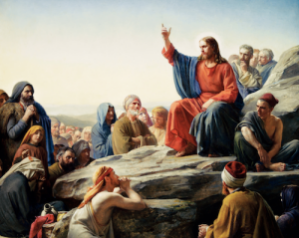That is why the present day English Calendar has Roman names. Since the Gregorian calendar was the work of a Roman catholic Pope Gregory XIII proposed by Aloysius Lilius an Italian doctor. Hence this calendar is also falsely claimed as Christian Calendar. But the truth is there is no relationship between the Rome, Roman Emperor, and Roman calendar with that of Christianity, because the Romans who were originally pagans and barbarians later converted into Christians after their Emperor named Constantine the Great converted into Christian at the age of 42 in 314 A.D. The actual Christian calendar is rooted in Bible. Why even prior to Pope Gregory XIII's time, a reform of the lunar cycle was used by the Church, with the Julian calendar, to calculate the date of Easter. The calendar for Christians is rooted in Bible not with Roman Emperor or Pope because Christianity itself stems from ancient Judaism as Jesus Christ himself was born in the Jewish family of the tribe of Judah. The calendar mentioned in the Bible is actually called as the Sacred Hebrew Lunar Calendar.
Note: The present day state of Israel follows two calendars
- The sacred Hebrew Jewish Lunar Calendar for religious purposes.
- The secular Hebrew Jewish Lunar Calendar for official purposes.
As already indicated many people may give many reason as to why Jan 1st is not a new year. One main reason both Jehovah’s witnesses and The Restored Church of God gives is of pagan origin which is confirmed in Wikipedia. Jews of present day State of Israel gives a different reason that it is of anti-Semitic origin. They claim that Sylvester was a fourth-century pope of the Catholic Church and a saint, who died on December 31, which is why many European countries adopted this name to mark the day of the Feast of the Pope, instead of New Year's Eve. The name reached Israel, seemingly due to the Ashkenazi influence, which is rather ironic since Sylvester is also known to have been viciously anti-Semitic; and according to the
Jewish literacy website January 1st was a day on which thousands of Jews were murdered. But for a lay person to understand that, needs lot of time, logical reasoning, little back ground of history and education. For a common man to understand the below explanation is very simple, reasoning, and quite satisfactory to prove that Jan 1st is not a New year’s day using the present day calendar what he/she is having in their own hands.To begin with the calendar given in the Bible is called as the sacred Hebrew Jewish Lunar Calendar. To prove that Jan 1st is not the beginning of the New Year we should hook the starting point.
Now where to hook which is the first month of the Year?
The hook is at September the 9th month of the present day calendar. But why from September onwards? It is so because the names of the first Eight month of the present day calendar from January to August has been changed and given the Roman god, goddess and emperors’ name, only from September the original names remains unchanged.
Now just think of September. What is the meaning of Septa? Septa is a Latin word which means Seven (7) so September was originally the seventh month as per Old Roman calendar.
Now just think of October. What is the meaning of Octo? Octo is a Latin word which means Eight (8) so October was originally the eighth month as per Old Roman calendar.
Now just think of November. What is the meaning of Novem? Novem is a Latin word which means nine (9) so November was originally the ninth month as per Old Roman calendar.
Now just think of December. What is the meaning of Decem? Decem is a Latin word which means Ten (10) so December was originally the tenth month as per Old Roman calendar.
Then think what should be the January? January should be the eleventh (11) month.
Then what about February ? February should be the twelfth (12) month
And finally March will be the 1st month .
So the point here is the present day calendar which people are commonly using itself reveals which is truth. The First month of Biblical calendar actually begins between March 15th and April 15th which is called in Bible as the month of Abib/Nissan. How then do we determine the 1st day of the beginning of the year? So when is the first new moon day for the year 2018? The first new moon day that occurs after the equinox is called the first day of the year as per lunar calendar. First of all we have to know what the meaning of equinox is. Equinox is derived from the Latin aequus (equal) and nox (night), because around the equinox, night and day are about equal length as shown in the below figure.
But equinox occurs twice a year, one in the month of March and another in the month of September. The equinox which occurs in the month of March is taken as reference and the first new moon day that occurs in March near the equinox is the first day of the year as per lunar calendar. So in 2018 when is this equinox occurs? As per Wikipedia is for till the year 2020.
But in 2018 the equinox that occurs is on March 20th and the New moon day that occurs near to the period of equinox is on 17th March 2018. So 18th March 2018 is considered as the first day or New Year’s Day of the year as per lunar calendar. This day is called as 1st day of Nissan. Though it is mentioned that this is the New Year’s Day as per Bible at
Exodus 12:2: "Jehovah now said to Moses and Aaron in the land of Egypt: “This month will be the beginning of the months for you. It will be the first of the months of the year for you." And also at Exodus 13:4: "You are going out on this day, in the month of A′bib." But in ancient times God never said his people to celebrate it, one reason may be because the pagans were already celebrating which is reflected as one of the South Indian festivals known as Chandramana Ugadi which is based upon this calculation which occurs on 18 March in 2018. The name Yugadi or Ugadi is derived from the Sanskrit words yuga (age) and ādi (beginning): "the beginning of a new age". Actually this Indian festival was started by an legendary Indian king in the year 78 AD called as Shalivahana or also called as Shaka ear. But historical research shows that Indian king Chashtana was a ruler of the Saka Western Kshatrapas in northwestern India during 78-130 CE and see the word Kshatrapas is a Sanskrit word derived from Persian term satraps meaning provincial governor. Hence this king might have had some connection with Persian world and hence had access to the Jewish people who by his time had already scattered due to the destruction of Jerusalem temple by Romans and that could be even possible to fix the Ugadi festival to the date that exactly falls on the first day of the Jewish month of Nissan (Exodus: 13:4). Though Jews were never told to celebrate a New Year they chose to celebrate at a different date and month other than pagan’s date that is on New moon day that occurs nearest to the equinox that occurs in the month of September which is called as Rosh Hashanah (9th Sept 2018) or called as Jewish New Year’s day but nowhere found in the Bible, but refers to Leviticus 23:24.Now as true Christians can you now discern why we will never celebrate the New Year on Jan 1st ? Simply that it did not originate in the Bible. Otherwise the nature itself tells that January in not the New Year. You observe all the months of the year , it is only between March and April that all the leaves in the trees are shed and new leaves sprouts up again which means the nature itself is speaking without the word that it is New year. Do you see any such changes during January? At last but not the least we have proved how Jan 1st is not the New Year’s day, but the matter doesn’t end here. By knowing when is the first day of the first month of the year as per biblical calendar we can even know when is the Jesus’ death day or memorial day which he said to observe in remembrance of me
(Luke:22:19). In 2018 the First day of Nissan is on 18th March if you count 14 days you will arrive at March 31st which is Nisan 14th and that will be remembered as Jesus’ death day or also called as Memorial Day by true Christians only. The same day Jewish people all over the world celebrate it as Passover day in remembrance of Exodus from Egypt under the leadership of Moses directed by Jehovah. We can also know in which month Jesus was born and when it occurs in the year 2018. To calculate when Jesus’ date of birth occurs in 2018 will be discussed in the separate article. This article is only meant to prove that Jan 1st is not a New Year’s Day as per bible and proper reason why true Christians will not celebrate New Year’s Day.Se um cristão, e especialmente uma Testemunha de Jeová, é convidado a apresentar provas da existência de Deus, é muito provável que ele cite o versículo quatro do terceiro capítulo da carta aos Hebreus: "toda casa é construída por alguém, mas quem construiu todas as coisas foi Deus".
O raciocínio é correto, nada veio do nada, mas tudo na terra é devido à vontade de um desenhista, mas é bom notar que Paulo não estava tentando discutir sobre a existência de um Criador. Ele falou com seus companheiros cristãos hebreus, que certamente não questionaram o fato de que o universo era governado por um ser poderoso que está por trás de tudo. Além disso, na antiguidade o problema certamente não era a não-crença em Deus, mas o oposto: as pessoas tendiam a acreditar em uma multidão de deuses. Ademais, Paulo, em uma ocasião, notou que um altar dedicado a um deus desconhecido havia sido feito, certamente por medo de esquecer de venerar uma divindade.

The first way to comment is to register in Disqus. If you have no account, click on the Disqus logo and follow the instructions.
You can comment as a guest: check “I’d rather post as a guest” and follow the instructions.
You can sign with your Google, Twitter or Facebook account.
At the moment, comments are not moderate, however, please respect common sense rules and current laws. (Note that moderation may come a posteriori)
